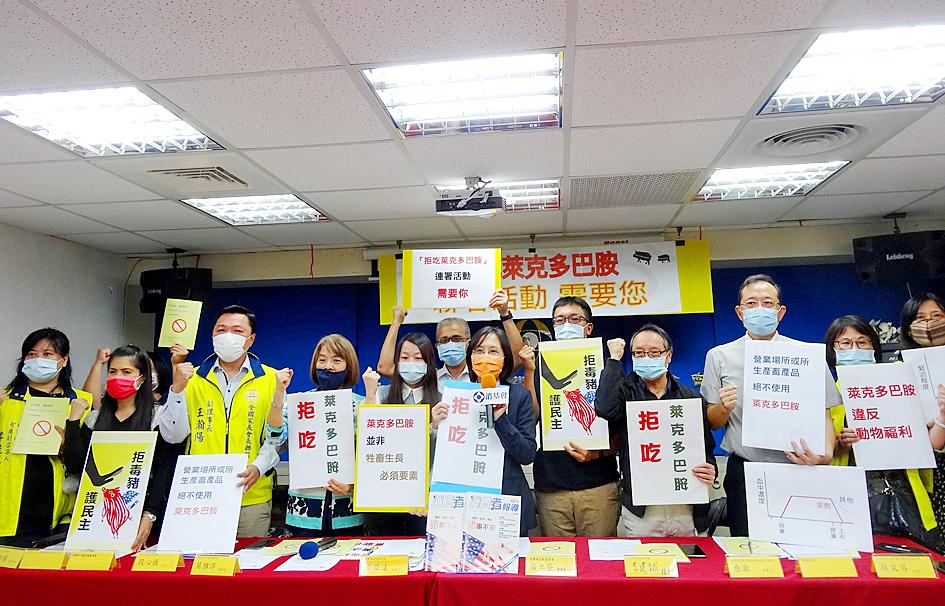The Consumers’ Foundation and several civic groups yesterday launched an online petition to demand that the government scrap its executive order easing restrictions on imports of US pork containing the leanness-enhancing agent ractopamine.
Ractopamine is harmful to animals and there is insufficient data on its effects on the health of humans, the foundation said.
President Tsai Ing-wen (蔡英文) on Aug. 28 announced that, starting on Jan. 1, Taiwan would ease restrictions on imports of US pork containing traces of the animal feed additive, as well as beef from cattle aged 30 months or older.

Photo: CNA
Seeing the number of people who sign the petition, the government would hopefully take what people are saying more seriously, the foundation said, adding that the government could use the petition as a bargaining tool in economic and trade negotiations with other nations.
Toxicology Society of Taiwan chairman Li Jih-heng (李志恆) said that although the Codex Alimentarius Commission set safety standards for ractopamine two years ago, they were based on a study that included only six participants.
The European Food Safety Authority has questioned the results, saying that they were only preliminary and, as it was not a double-blind study, the results might be biased, Li said.
The level of neurotoxins in ractopamine and the effects on people with cardiovascular disease are unclear, he said.
Some animal studies have identified links between ractopamine and uterine fibroids, non-cancerous tumors that can grow in the uterus, he added.
Psychiatrist Su Wei-shuo (蘇偉碩) said that despite the government’s claims that ractopamine only poses health risks if consumed in large amounts, long-term exposure to low doses is more dangerous.
Such exposure can affect fertility, increase the prevalence of certain types of cancer and aggravate schizophrenia, Su added.
The petition can be found at https://reurl.cc/4mbLrX.

The manufacture of the remaining 28 M1A2T Abrams tanks Taiwan purchased from the US has recently been completed, and they are expected to be delivered within the next one to two months, a source said yesterday. The Ministry of National Defense is arranging cargo ships to transport the tanks to Taiwan as soon as possible, said the source, who is familiar with the matter. The estimated arrival time ranges from late this month to early next month, the source said. The 28 Abrams tanks make up the third and final batch of a total of 108 tanks, valued at about NT$40.5 billion

A group from the Taiwanese Designers in Australia association yesterday represented Taiwan at the Midsumma Pride March in Melbourne. The march, held in the St. Kilda suburb, is the city’s largest LGBTQIA+ parade and the flagship event of the annual Midsumma Festival. It attracted more than 45,000 spectators who supported the 400 groups and 10,000 marchers that participated this year, the association said. Taiwanese Designers said they organized a team to march for Taiwan this year, joining politicians, government agencies, professionals and community organizations in showing support for LGBTQIA+ people and diverse communities. As the first country in Asia to legalize same-sex

MOTIVES QUESTIONED The PLA considers Xi’s policies toward Taiwan to be driven by personal considerations rather than military assessment, the Epoch Times reports Chinese President Xi Jinping’s (習近平) latest purge of the Chinese People’s Liberation Army (PLA) leadership might have been prompted by the military’s opposition to plans of invading Taiwan, the Epoch Times said. The Chinese military opposes waging war against Taiwan by a large consensus, putting it at odds with Xi’s vision, the Falun Gong-affiliated daily said in a report on Thursday, citing anonymous sources with insight into the PLA’s inner workings. The opposition is not the opinion of a few generals, but a widely shared view among the PLA cadre, the Epoch Times cited them as saying. “Chinese forces know full well that

An elderly man with underlying health conditions died in mid-January, eight days after the onset of symptoms, marking Taiwan’s first hantavirus death this year, the Centers for Disease Control (CDC) said yesterday. The man, who was in his 70s and lived in Taipei’s Daan District (大安), tested positive posthumously for hantavirus after passing away on Jan. 13 from sepsis complicated by multiple organ failure and pneumonia, the CDC said in a press release. According to the CDC, the man sought treatment on Jan. 6 for respiratory issues and low blood pressure before returning two